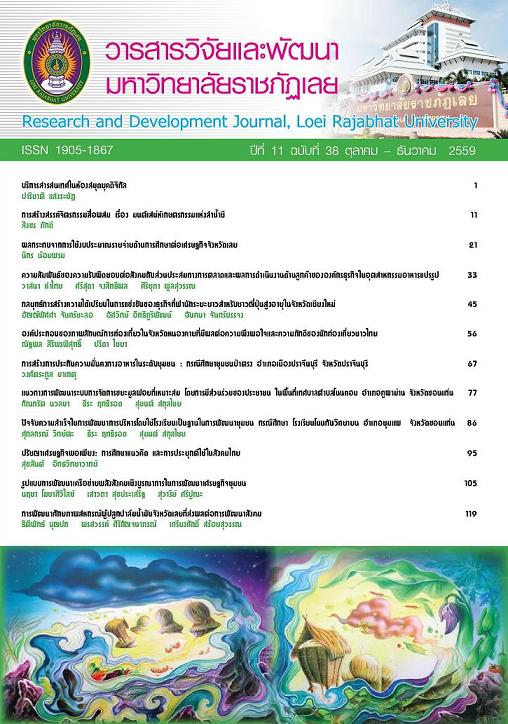กลยุทธ์การสร้างความได้เปรียบในการแข่งขันของธุรกิจที่พำนักระยะยาวสำหรับชาวญี่ปุ่นสูงอายุในจังหวัดเชียงใหม่
Keywords:
ความได้เปรียบในการแข่งขัน, ธุรกิจที่พำนักระยะยาว, ชาวญี่ปุ่นสูงอายุ, competitive advantage, long-stay lodging business, elderly JapaneseAbstract
บทคัดย่อ
งานวิจัยนี้มีวัตถุประสงค์คือเพื่อศึกษาสภาพปัจจุบันและปัญหาของธุรกิจที่พำนักระยะยาวสำหรับชาวญี่ปุ่นสูงอายุในจังหวัดเชียงใหม่ และเพื่อนำเสนอกลยุทธ์การสร้างความได้เปรียบในการแข่งขันของธุรกิจที่พำนักระยะยาวสำหรับชาวญี่ปุ่นสูงอายุในจังหวัดเชียงใหม่ วิธีการศึกษาเป็นการวิจัยเชิงคุณภาพ ประกอบด้วยการวิจัยเอกสาร การสัมภาษณ์เชิงลึก โดยใช้แบบสัมภาษณ์แบบมีโครงสร้างกับผู้ประกอบการ 7 ท่าน ผู้บริหารจากหน่วยงานภาครัฐ 2 ท่าน ชาวญี่ปุ่นที่พำนักระยะยาวในจังหวัดเชียงใหม่ 5 ท่าน และทำการสัมภาษณ์ผู้ทรงคุณวุฒิ 7 ท่าน และการสังเกตแบบไม่มีส่วนร่วม
ผลการวิจัยสภาพแวดล้อมภายในของธุรกิจที่พำนักระยะยาวสำหรับชาวญี่ปุ่นสูงอายุคือ ประเภทของธุรกิจ ลักษณะการครอบครอง รูปแบบการบริหาร การอำนวยความสะดวก การพัฒนาสถานประกอบการที่พำนักระยะยาว ตำแหน่งในการแข่งขัน และการสร้างกิจกรรมร่วมกับชุมชน สภาพแวดล้อมภายนอกของธุรกิจที่พำนักระยะยาวสำหรับชาวญี่ปุ่นสูงอายุคือ โครงสร้างสาธารณูปโภค ความเจริญสะดวกสบาย ผู้คนมีอัธยาศัยน้ำใจ เชียงใหม่มีธรรมชาติ วัฒนธรรม และประวัติศาสตร์ ค่าครองชีพถูกกว่าในญี่ปุ่น นโยบายญี่ปุ่นเรื่องพำนักระยะยาวในต่างประเทศ และจำนวนประชากรญี่ปุ่นสูงอายุมีเพิ่มมากขึ้น ปัญหาของธุรกิจที่พำนักระยะยาวสำหรับชาวญี่ปุ่นสูงอายุคือปัญหาทางด้านสังคม ด้านเศรษฐกิจ ด้านกฎหมายและนโยบายภาครัฐ และด้านเทคโนโลยี ส่วนกลยุทธ์การสร้างความได้เปรียบในการแข่งขันของธุรกิจที่พำนักระยะยาวสำหรับชาวญี่ปุ่นสูงอายุได้แก่ กลยุทธ์การพัฒนาความสะดวกสบายของที่พำนักระยะยาว กลยุทธ์การยกระดับมาตรฐานที่พำนักระยะยาวและการบริการ กลยุทธ์การประชาสัมพันธ์และส่งเสริมการตลาด กลยุทธ์การสร้างเครือข่ายพันธมิตรกับภาครัฐ ภาคเอกชน และกลยุทธ์การส่งเสริมการมีกิจกรรมของชาวญี่ปุ่นสูงอายุกับชุมชน
ข้อเสนอแนะ คือ ภาคเอกชน ภาครัฐ และชุมชน ควรมีการสร้างเครือข่ายในการแลกเปลี่ยนข้อมูลและสร้างความร่วมมือร่วมกันอย่างต่อเนื่อง เพื่อพัฒนาธุรกิจที่พำนักระยะยาวสำหรับชาวญี่ปุ่นสูงอายุให้เติบโตต่อไปอย่างมั่นคง
Abstract
This research aimed to study the current circumstances and problems of the long-stay lodging business for elderly Japanese in Chiang Mai and to propose strategies to create competitive advantage in this industry. The research methodology was qualitative research conducted by means of documentary
research, non-obtrusive observation, and in-depth interviews using structured interview forms. The research participants were seven entrepreneurs, two executives from public agencies, five elderly Japanese who have been living in Chiang Mai for a long period and seven experts.
The findings indicate that the internal circumstances of the long-stay lodging business for elderly Japanese can be classified into business type, lodger occupation type, managerial type, accommodation facilitation, accommodation development, competitive position, and promotion of activities of the elderly Japanese within the community. External circumstances of the long-stay lodging business for elderly Japanese can be classified into infrastructure, convenience, the character of local people, the nature, culture, and history of Chiang Mai, cheaper daily expenses compared with Japan, Japan’s policy regarding long stays overseas, and the increasing number of the elderly Japanese. Problems involving the long-stay lodging business faced by elderly Japanese include social, economic, political and public policy aspects as well as technological problems. Strategies to create competitive advantage in the long-stay lodging business for elderly Japanese in Chiang Mai include improving accommodation facilities, improving standards in the long-stay lodging business and its services, engaging in public relations and marketing, building an alliance network with the public, private, and community sectors, and promoting activities of elderly Japanese lodgers that involving interactions with the community.
It is proposed that the private, public, and community sectors should exchange information and continuously build networks in order to develop the long-stay lodging business for elderly Japanese sustainably.
Downloads
Issue
Section
License
ข้อความที่ปรากฎในวารสารฉบับนี้เป็นความคิดเห็นของผู้เขียนแต่ละท่าน สถาบันวิจัยและพัฒนา มหาวิทยาลัยราชภัฏเลย และกองบรรณาธิการ ไม่จำเป็นต้องเห็นด้วยและไม่มีส่วนรับผิดชอบใดๆ
สถาบันวิจัยและพัฒนา มหาวิทยาลัยราชภัฏเลย ขอให้ผู้อ่านอ้างอิงในกรณีที่ท่านคัดลอกเนื้อหาบทความในวารสารฉบับนี้






